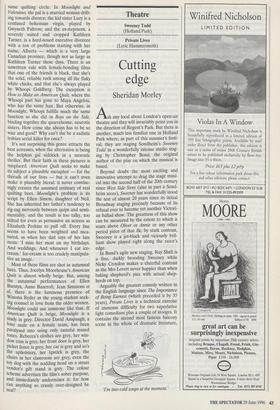Theatre
Sweeney Todd (Holland Park) Private Lives (Lyric Hammersmith)
Cutting edge
Sheridan Morley
Ask any local about London's open-air theatre and they will invariably point you in the direction of Regent's Park. But there is another, much less familiar one in Holland Park where, as part of this summer's festi- val, they are staging Sondheim's Sweeney Todd in a wonderfully intense studio stag- ing by Christopher Bond, the original author of the play on which the musical is based.
Beyond doubt the most exciting and innovative attempt to drag the stage musi- cal into the second half of the 20th century since West Side Story (also in part a Sond- heim score), Sweeney has wonderfully stood the test of almost 20 years since its initial Broadway staging precisely because of its refusal ever to become yet another Victori- an ballad show. The greatness of this show can be measured by the extent to which it soars above Oliver or Annie or any other period piece of that ilk; by stark contrast, Sweeney is a jet-black and viciously bril- liant show played right along the razor's edge. In Bond's agile new staging, Ray Shell is a fine, darkly brooding Sweeney while Nicky Croydon makes a cheerful contrast as the Mrs Lovett never happier than when baking shepherd's pies with actual shep- herds on top. Arguably the greatest comedy written in the English language since The Importance of Being Earnest (which preceded it by 35 years), Private Lives is a technical exercise of immense difficulty for two superlative light comedians plus a couple of stooges. It contains the second most famous balcony scene in the whole of dramatic literature, 'I'm into cold soups at the moment.' but precious few actual jokes (`Women should be struck regularly, like gongs' is more of an aphorism and anyway nowadays considered somewhat sexist) and there is almost no action of any kind. A couple of once-married divorcees meet accidentally on a hotel terrace in Deauville, decide they would rather be remarried to each other and run away from their new partners to Paris. And that, across three entire acts, is more or less that.
When the play first opened at the Phoenix Theatre, one critic wrote that 'it was like watching buckets of filth being thrown around the stage'. Coward and Lawrence, in fact, only ever played it for three months in the West End and three on Broadway, so low was their boredom threshold for long runs, so the whole Noel and Gertie legend rests on 24 weeks and a scratchy gramophone record on which the great love scene is reduced to three min- utes, mainly about the flatness of Norfolk and the potency of cheap music.
Since then, however, the play has been in constant revival all over the world, often troubled by serious miscasting (Liz Taylor and Richard Burton in New York, Joan Collins in London) or, worse, destroyed by some ambitious young director who feels the urge to 'put his mark' on the play or give it some kind of latterday scenic 'con- cept'.
Happily, Mike Alfreds, who now brings the play to the Lyric Hammersmith as part of a 'method and madness' season in which the same quartet of actors also work their way through Jude the Obscure and next week a new play, Flesh and Blood, feels under no such obligation. True, he has made a few changes: the long song 'Some Day I'll Find You' is bizarrely replaced by a cabaret set of other Thirties hits, while at the end, instead of having Victor and Sybil creep out of the door leaving their new partners in the midst of a pitched battle (a device Coward had also used for the end of Hay Fever), he has Elyot and Amanda freeze in a clinch, as if to remind the audi- ence that they are together again.
Since the play is really about nothing but their reunion, we scarcely need the final nudge; but these are minor complaints about a generally admirable staging in which Simon Robson and Abigail Thaw are suitably sexily tortured by their predica- ment, while Geraldine Alexander and Mar- tin Marquez are wonderfully ill at ease as their long-suffering new partners.
Deep down, this is something more than a light comedy of appalling manners; it is a play about sexual tension and obsession, about people who can live neither together nor apart, and perhaps also about the will- ingness of those in love not to care about the damage they are inflicting on others. That is why Private Lives has been revived more than any other of Coward's 40 plays, and that is why it is best left alone to speak for itself in Coward's inimitable mix of cyn- icism and sentiment.



























































 Previous page
Previous page